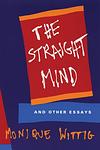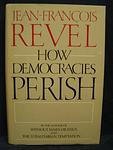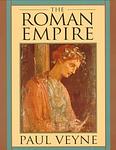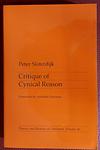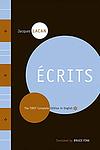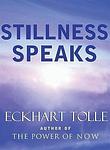The Greatest Iranian, French, German "Nonfiction" Books Since 1970
Click to learn how this list is calculated.
This list represents a comprehensive and trusted collection of the greatest books. Developed through a specialized algorithm, it brings together 305 'best of' book lists to form a definitive guide to the world's most acclaimed books. For those interested in how these books are chosen, additional details can be found on the rankings page.
Genres
Countries
Date Range
Reading Statistics
Click the button below to see how many of these books you've read!
Download
If you're interested in downloading this list as a CSV file for use in a spreadsheet application, you can easily do so by clicking the button below. Please note that to ensure a manageable file size and faster download, the CSV will include details for only the first 500 books.
Download-
26. The Straight Mind by Monique Wittig
The book is a collection of feminist essays that challenge the conventional understanding of gender and sexuality, positing that the concept of "woman" is a social construct created by a heterosexual society to uphold a binary gender system. The author argues that this system perpetuates the oppression of women and LGBTQ+ individuals by reinforcing the straight mind, a heteronormative way of thinking that marginalizes any form of difference. Through a radical rethinking of language, literature, and social structures, the essays advocate for a new feminist perspective that seeks to dismantle the straight mind and create a society where all forms of identity and expression are valued equally.
The 5329th Greatest Book of All Time -
27. Daughter Of Persia: A Woman's Journey From Her Father's Harem Through The Islamic Revolution by Sattareh Farman-Farmaian
This memoir recounts the extraordinary life of a woman born into a privileged family in early 20th-century Iran, who witnessed the dramatic shifts of her country's social and political landscape. Growing up in a polygamous household, she broke with tradition to pursue an education abroad, later returning to Iran to become a pioneering advocate for social reform and women's rights. Her story spans the rise and fall of the Pahlavi dynasty, the advent of the Islamic Revolution, and her subsequent exile, offering a personal lens on Iran's complex history and the role of women within it. Through her journey, she embodies the struggles and resilience of a nation in the face of modernity and change.
The 5329th Greatest Book of All Time -
28. Camera Lucida by Roland Barthes
The book in question is a seminal work in the field of photography theory, blending personal reflection with philosophical investigation. The author delves into the nature of photography, exploring the medium's ability to capture the essence of a moment and its subjects. Through a two-part analysis, the author introduces concepts such as the studium and punctum to articulate the layers of meaning and emotional response elicited by photographs. The work is also a meditation on loss and memory, inspired by the author's search for the essence of his late mother in her photographs. The text is both an intimate journey and a critical examination of the power of images to evoke and preserve the fleeting nature of existence.
The 5378th Greatest Book of All Time -
29. Funny in Farsi by Firoozeh Dumas
This memoir tells the story of an Iranian family who migrated to America in the 1970s, offering a humorous take on their experiences. The narrative focuses on the author's childhood and adolescence, exploring themes of cultural identity, assimilation, and the immigrant experience in America. It highlights the family's journey of navigating a new country and culture, while still holding on to their Iranian roots. The book showcases the author's ability to find humor in the most challenging situations, making it a heartwarming and amusing read.
The 5445th Greatest Book of All Time -
30. Orson Welles by André Bazin
This book provides an in-depth analysis of Orson Welles, a seminal figure in cinematic history, whose innovative techniques and storytelling prowess left an indelible mark on the world of film. The author meticulously examines Welles' entire oeuvre, from his groundbreaking work in "Citizen Kane" to lesser-known projects, highlighting his artistic evolution, thematic interests, and the distinctive use of sound and visuals. Through a critical lens, the book explores how Welles challenged conventional filmmaking norms and discusses his lasting influence on both contemporary directors and the broader cinematic landscape.
The 5517th Greatest Book of All Time -
31. How Democracies Perish by Jean François Revel
This book provides a deep analysis of the threats faced by democracies, specifically from totalitarian regimes. The author argues that democracies are often their own worst enemies, being too tolerant and indecisive, which can lead to their downfall. He further discusses how democracies can be manipulated by totalitarian regimes through propaganda and misinformation. The book serves as a warning and a call to action for democratic societies to recognize these threats and take steps to defend their values and institutions.
The 5627th Greatest Book of All Time -
32. Footsteps by Richard Holmes
"Footsteps" is a captivating blend of biography and travel literature, where the author retraces the journeys of various literary figures to better understand their lives and works. Through his explorations, he follows in the footsteps of authors such as Robert Louis Stevenson, Mary Wollstonecraft, and Percy Bysshe Shelley, visiting the places they lived and wrote about. This immersive approach allows the author to delve deeply into the historical and emotional landscapes that shaped these writers, blending rich narrative with scholarly insights to offer a unique perspective on both the subjects and their settings.
The 5635th Greatest Book of All Time -
33. The Films In My Life by Francois Truffaut
"The Films In My Life" is a collection of essays and reviews by a celebrated French filmmaker, offering insights into the world of cinema from the 1950s through the 1970s. In this book, the author discusses a wide range of films, from classics to lesser-known works, providing personal and critical perspectives that reflect his experiences as both a filmmaker and a film critic. The essays not only delve into the artistic and technical aspects of the films but also explore the influence of cinema on society and the individual, showcasing the author's deep love for and understanding of the medium.
The 5662nd Greatest Book of All Time -
34. The Roman Empire by Paul Veyne
"The Roman Empire" delves into the intricate and expansive history of Rome, exploring its political, social, and cultural dynamics. The book provides a detailed examination of how Rome evolved from a small city-state to a vast empire, influencing the Western world profoundly. The author analyzes the mechanisms of power and governance within the empire, the role of military conquests and political alliances, and the complex interactions between Roman and other cultures. Additionally, the narrative discusses the daily lives of Roman citizens, the economic frameworks, and the philosophical and artistic contributions that shaped the legacy of the Roman Empire.
The 5662nd Greatest Book of All Time -
35. Montaillou by Emmanuel Le Roy Ladurie
The book is a detailed historical study of the lives of the inhabitants of Montaillou, a small village in the French Pyrenees, during the early 14th century. Based on the meticulous records of Jacques Fournier, the Bishop of Pamiers who later became Pope Benedict XII, the book explores the daily lives, beliefs, and social structures of a medieval community. It particularly focuses on how the villagers, including peasants and shepherds, interacted with the Cathar heresy and the Inquisition's efforts to suppress it. The work provides an in-depth look at medieval European rural life, religious practices, and the impact of ecclesiastical authority on individual lives.
The 5662nd Greatest Book of All Time -
36. The History Of Sexuality by Michel Foucault
"The History of Sexuality" explores the complex relationship between power and sexual discourse, arguing that since the 17th century, Western societies have not repressed sexuality but rather incited it, making it an object of public discourse. The author examines how power operates through the production of knowledge about sex and uses this perspective to challenge the conventional narrative that society has been progressively liberating sexuality from repression. The book delves into the ways in which sexual norms and power relations are intertwined, suggesting that the discourse on sexuality is a tool of power used to regulate both individual bodies and entire populations.
The 5714th Greatest Book of All Time -
37. The Pleasure of the Text by Roland Barthes
"The Pleasure of the Text" is a philosophical and literary exploration of the act of reading. The author presents the idea that there are two types of pleasures associated with reading: "pleasure of the text" and "bliss." The former is a comfortable enjoyment derived from the familiar, the latter a disruptive and challenging joy that comes from the new and unexpected. The book delves into the interaction between reader and text, highlighting the role of the reader in interpreting and creating meaning, and challenges traditional notions of authorship and textual authority.
The 5738th Greatest Book of All Time -
38. This Sex Which Is Not One by Luce Irigary
"This Sex Which Is Not One" explores the complex ways in which women have been represented in Western discourse, particularly focusing on the limitations imposed by a male-centric language that defines women primarily in terms of difference from men. The author critiques traditional theories of psychoanalysis and philosophy, arguing that they perpetuate a binary view of gender that fails to capture the true fluidity and multiplicity of female identity. Through a series of essays, the text advocates for a new form of feminist thinking that acknowledges and values women's sexuality and linguistic expression as plural, fluid, and dynamic, challenging the structures that have historically marginalized women's voices and experiences.
The 5805th Greatest Book of All Time -
39. Cinema And History by Marc Ferro
"Cinema and History" explores the intricate relationship between cinema and historical events, analyzing how films reflect and shape public perceptions of history. The book delves into the ways filmmakers from various cultures and periods have portrayed historical figures and incidents, highlighting the influence of political, social, and cultural contexts on these depictions. It also examines the role of propaganda, the impact of historical films on collective memory, and the differences between cinematic and historical narratives. Through a critical lens, the author discusses the potential of cinema to both distort historical truth and provide profound insights into historical realities.
The 5805th Greatest Book of All Time -
40. Essays On Music by Theodor Adorno
This collection is a comprehensive anthology of critical essays on the subject of music, written by one of the 20th century's most influential philosophers and social critics. The work delves into the complexities of musical composition, performance, and reception, offering a profound exploration of the social, political, and cultural dimensions of the musical experience. The author critiques the commodification of music in capitalist societies and the way this impacts artistic authenticity and the listener's experience. Through a series of essays, the author examines various genres and eras, from classical to jazz to popular music, applying a rigorous theoretical framework that draws from Marxist thought, sociology, and psychoanalysis to dissect the role of music in modern life.
The 5891st Greatest Book of All Time -
41. Poussières D'étoiles by Hubert Reeves
"Poussières d'étoiles" is a poetic exploration of the cosmos and our place within it, delving into the intricate connections between the universe and the microscopic elements that compose life on Earth. The book weaves together astronomy, physics, biology, and philosophy to illustrate how the atoms that make up our bodies were once part of ancient celestial phenomena. Through accessible language and engaging storytelling, the narrative takes readers on a journey from the Big Bang to the evolution of life, emphasizing the awe-inspiring reality that we are literally made of stardust, sharing a fundamental bond with the vast, dynamic universe around us.
The 6072nd Greatest Book of All Time -
42. Stranglehold On Africa by René Dumont
"Stranglehold on Africa" is a critical examination of the post-colonial economic and political challenges faced by African nations. The book delves into the detrimental effects of foreign aid dependency, the exploitation of African resources by Western countries, and the pervasive corruption and mismanagement within African governments. The author argues that these factors have collectively hindered sustainable development and perpetuated a cycle of poverty and underdevelopment. Through a blend of analysis and firsthand observation, the book calls for a reevaluation of international policies and aid strategies, advocating for more equitable and sustainable approaches to supporting Africa's self-sufficiency and growth.
The 6085th Greatest Book of All Time -
43. The Hour Of Our Death by Philippe Ariès
"The Hour of Our Death" delves into the profound and evolving relationship between humanity and death from the early Middle Ages to the present. The book presents a detailed historical analysis of attitudes toward death, revealing how cultural, social, and religious elements have shaped human responses to mortality. It explores the rituals of dying and the customs of mourning, highlighting the transition from a familiar acceptance of death's constant presence in daily life to its modern sequestration and medicalization, which has altered but not diminished its profound impact on the human psyche and society.
The 6121st Greatest Book of All Time -
44. Critique Of Cynical Reason by Peter Sloterdijk
The book provides a deep exploration of cynicism as a pervasive and influential mindset in contemporary society, tracing its evolution from the classical cynicism of antiquity to its modern form, which the author describes as "enlightened false consciousness." The work delves into the philosophical, social, and psychological dimensions of cynicism, examining how it serves both as a defense mechanism and a form of social critique. Through a blend of philosophical analysis, cultural commentary, and historical insight, the book challenges readers to understand and confront the cynical attitudes that pervade modern culture and to consider the possibilities for genuine sincerity and commitment in a seemingly disenchanted world.
The 6254th Greatest Book of All Time -
45. Prisoner Of Love by Jean Genet
"Prisoner of Love" is a non-fiction book that blends memoir, history, and philosophical reflection. It chronicles the author's experiences in the late 1960s and early 1970s among Palestinian fedayeen (guerrilla fighters) and later, in the mid-1970s, with the Black Panthers in Jordan. The narrative delves into the daily lives of these revolutionaries, their struggles, and the author's own reflections on issues of love, loyalty, and identity. Through his immersive and poetic prose, the author explores the complexities of political commitment and the human condition, offering a deeply personal yet universally resonant account of solidarity and resistance.
The 6454th Greatest Book of All Time -
46. Capital in the Twenty-First Century by Thomas Piketty
This book provides a comprehensive analysis of the dynamics of capital accumulation and distribution over the last few centuries. The author argues that the rate of capital return in developed countries is persistently greater than the rate of economic growth, leading to high levels of wealth inequality. The book further suggests that the level of income inequality is not primarily a result of differences in individual labor income but rather the result of differences in capital ownership and the income derived from it. The author proposes a global tax on wealth to prevent soaring inequality.
The 6638th Greatest Book of All Time -
47. Capitalism, Socialism, Ecology by Andre Gorz
In "Capitalism, Socialism, Ecology," the author explores the complex relationships and conflicts between economic systems and environmental sustainability. He critically examines the failures of both capitalism and real-existing socialism in addressing ecological crises, arguing that neither system is adequately equipped to tackle the environmental challenges of our time. The book advocates for a new ecological order that transcends traditional economic paradigms, proposing a radical restructuring of societal values and economic practices to prioritize sustainability, social justice, and human well-being over profit and growth. Through this analysis, the author contributes to the broader discourse on environmental politics and the search for viable alternatives to unsustainable economic models.
The 6687th Greatest Book of All Time -
48. Écrits: The First Complete Edition in English by Jacques Lacan
This book is a comprehensive collection of essays by a renowned psychoanalyst, offering readers an in-depth understanding of his theories on human psychology. The author delves into complex topics such as the unconscious, the mirror stage, and the concept of the Other, while also exploring the intersection of psychoanalysis with philosophy, linguistics, and anthropology. The book challenges conventional understanding of subjectivity and identity, making it a seminal work in the field of psychoanalysis.
The 6712th Greatest Book of All Time -
49. Stillness Speaks by Eckhart Tolle
The book is a guide to discovering profound inner peace and serenity through the power of mindfulness and stillness. It delves into the transformative potential of living in the present moment and disengaging from the constant chatter of the mind. The author presents a series of meditative insights and wisdom that encourage readers to connect with the depth of the present moment, transcending ego-driven thoughts and emotions. By embracing stillness, the book suggests that individuals can access a deeper sense of self-awareness, leading to a more fulfilling and enlightened existence.
The 6940th Greatest Book of All Time -
50. The Invention Of Nature: Alexander Von Humboldt’s New World by Andrea Wulf
"The Invention of Nature" is a biographical account of Alexander von Humboldt, a 19th-century explorer, scientist, and naturalist who revolutionized the way we understand the natural world. Andrea Wulf chronicles Humboldt's travels across South America, his encounters with indigenous peoples, and his groundbreaking scientific discoveries that challenged prevailing notions of the natural world. Humboldt's ideas about interconnectedness and the unity of nature were ahead of their time and continue to influence environmentalism and conservation today. Wulf's book is a masterful exploration of one of history's most fascinating and influential figures.
The 7072nd Greatest Book of All Time
Reading Statistics
Click the button below to see how many of these books you've read!
Download
If you're interested in downloading this list as a CSV file for use in a spreadsheet application, you can easily do so by clicking the button below. Please note that to ensure a manageable file size and faster download, the CSV will include details for only the first 500 books.
Download